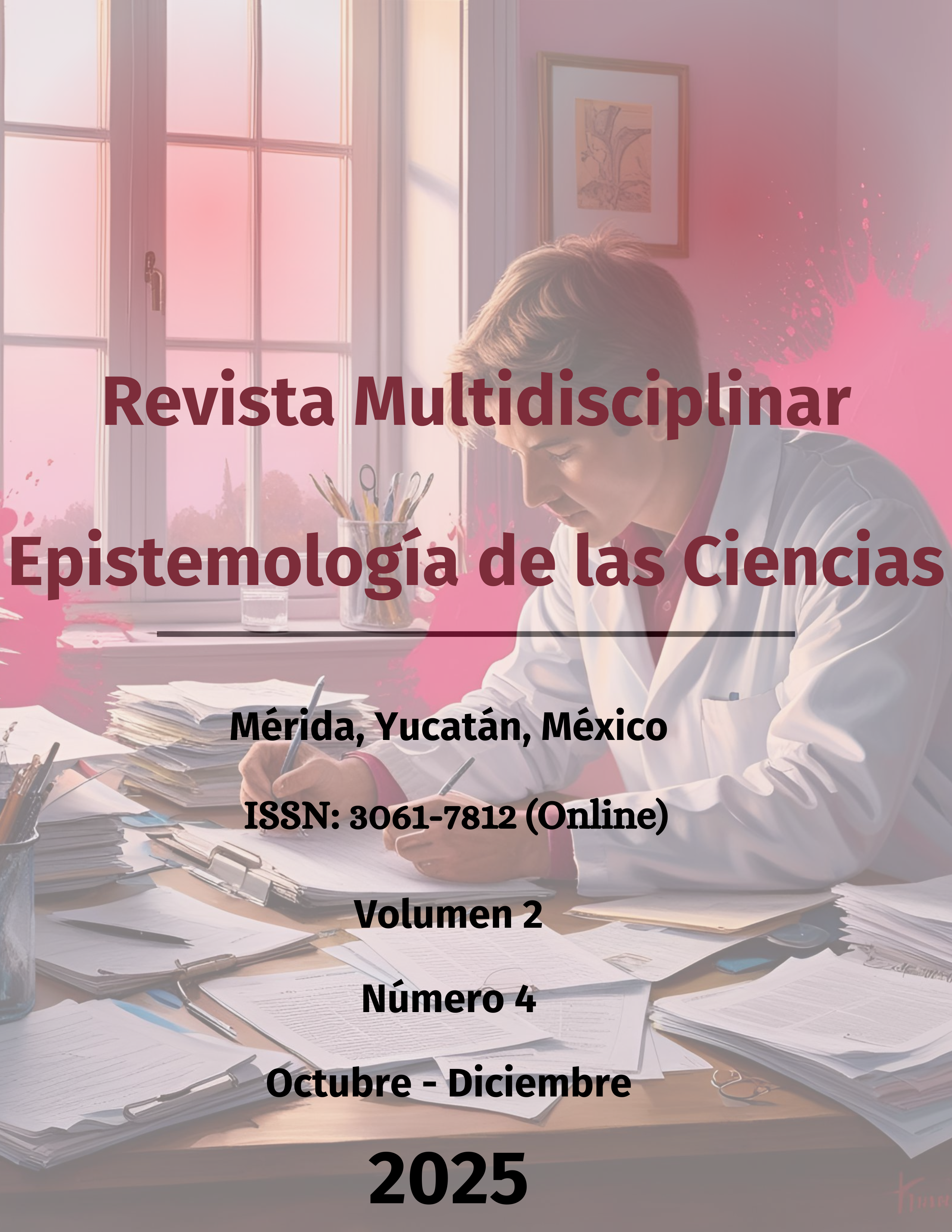Promoting innovation and entrepreneurial creativity as a strategy to solve problems in the school environment
DOI:
https://doi.org/10.71112/ccqcev58Keywords:
educational innovation, entrepreneurial creativity, meaningful learning, school participation, sustainable developmentAbstract
This study analyzes the promotion of innovation and entrepreneurial creativity as a strategy for solving school problems in public institutions in the Naranjal canton, Guayas province, Ecuador. A mixed-method, sequential explanatory approach was applied, combining quantitative measurements of creative and entrepreneurial competencies with interviews and focus groups to explore teacher and student perceptions. The intervention was based on the Design Thinking methodology, developing projects that addressed real challenges facing the educational community. The results showed significant improvements in competencies such as idea generation, problem-solving, and collaborative work, along with increased student motivation and active participation. The qualitative analysis highlighted the importance of contextualizing learning within local problems and the need for ongoing teacher training to sustain changes. Overall, the findings confirm that innovation and creative entrepreneurship are effective tools for transforming learning, improving school climate, and contributing to sustainable development, supporting educational innovation policies in Ecuador.
Downloads
References
Appelbaum, M., Cooper, H., Kline, R. B., Mayo-Wilson, E., Nezu, A. M., & Rao, S. M. (2018). Journal article reporting standards for quantitative research in psychology: The APA Publications and Communications Board task force report.American Psychologist, 73(1), 3–25. https://doi.org/10.1037/amp0000191 DOI: https://doi.org/10.1037/amp0000191
Bacigalupo, M., Kampylis, P., Punie, Y., & Van den Brande, G. (2016). EntreComp: The Entrepreneurship Competence Framework. Publications Office of the European Union. https://doi.org/10.2791/593884
Darling-Hammond, L., Flook, L., Cook-Harvey, C., Barron, B., & Osher, D. (2020). Implications for educational practice of the science of learning and development. Applied Developmental Science, 24(2), 97–140. https://doi.org/10.1080/10888691.2018.1537791 DOI: https://doi.org/10.1080/10888691.2018.1537791
Darling-Hammond, L., Hyler, M. E., & Gardner, M. (2019). Effective teacher professional development. Learning Policy Institute. https://learningpolicyinstitute.org/product/effective-teacher-professional-development-report
Fetters, M. D., Curry, L. A., & Creswell, J. W. (2013). Achieving integration in mixed methods designs—Principles and practices. Health Services Research, 48(6 Pt 2), 2134–2156. https://doi.org/10.1111/1475-6773.12117 DOI: https://doi.org/10.1111/1475-6773.12117
Flick, U. (2018). An introduction to qualitative research (6th ed.). SAGE Publications. https://doi.org/10.4135/9781529716641 DOI: https://doi.org/10.4135/9781529716641
Fullan, M., & Quinn, J. (2016). Coherence: The right drivers in action for schools, districts, and systems. Corwin Press. https://us.corwin.com/en-us/nam/coherence/book245210
Hargreaves, A., & Fullan, M. (2020). Professional capital after the pandemic: Revisiting and reimagining the triad of professional capital. Teachers College Press. https://www.researchgate.net/publication/343233203_Professional_capital_after_the_pandemic_revisiting_and_revising_classic_understandings_of_teachers'_work DOI: https://doi.org/10.1108/JPCC-06-2020-0039
IDEO. (2012). Design Thinking for Educators (Toolkit & Workbook).https://f.hubspotusercontent30.net/hubfs/6474038/Design%20for%20Learning/IDEO_DTEdu_v2_toolkit%2Bworkbook.pdf
Irwan, M., Sumanik, E., & Saodi, A. (2024). Fostering entrepreneurial creativity and innovation through supportive educational environments. Journal of Educational Research and Practice, 14(2), 45–60. https://papers.ssrn.com/sol3/Delivery.cfm/5008378.pdf
Johnson, R. B., & Onwuegbuzie, A. J. (2004). Mixed methods research: A research paradigm whose time has come.Educational Researcher, 33(7), 14–26. https://doi.org/10.3102/0013189X033007014 DOI: https://doi.org/10.3102/0013189X033007014
Kozlinska, I., Mets, T., & Ruskovaara, E. (2023). Problem-based and action-oriented approaches in entrepreneurship education: Evidence from Europe. Education + Training, 65(3), 373–392.
Leithwood, K., Sun, J., & Pollock, K. (2021). How school leadership influences student learning: A review of evidence for policy and practice. Springer. https://wallacefoundation.org/sites/default/files/2023-07/How-Leadership-Influences-Student-Learning.pdf
Ministerio de Educación del Ecuador. (2017a). Ley Orgánica de Educación Intercultural (LOEI) — Codificado.https://educacion.gob.ec/wp-content/uploads/downloads/2017/02/Ley_Organica_de_Educacion_Intercultural_LOEI_codificado.pdf
Ministerio de Educación del Ecuador. (2017b). Reglamento General a la LOEI. https://educacion.gob.ec/wp-content/uploads/downloads/2017/05/Reglamento-General-Ley-Organica-Educacion-Intercultural.pdf
Ministerio de Educación del Ecuador. (2023a). Acuerdo MINEDUC-MINEDUC-2023-00076-A: Lineamientos para el fomento de la innovación educativa del Ecuador. https://educacion.gob.ec/wp-content/uploads/downloads/2023/11/MINEDUC-MINEDUC-2023-00076-A.pdf
Ministerio de Educación del Ecuador. (2023b). Lineamientos para el reconocimiento, sostenibilidad y escalabilidad de la innovación educativa. https://educacion.gob.ec/wp-content/uploads/downloads/2023/11/Lineamientos-reconocimiento-sostenibilidad-escalabilidad-innovacion-educativa.pdf
O’Brien, B. C., Harris, I. B., Beckman, T. J., Reed, D. A., & Cook, D. A. (2014). Standards for reporting qualitative research: A synthesis of recommendations. Academic Medicine, 89(9), 1245–1251. https://doi.org/10.1097/ACM.0000000000000388 DOI: https://doi.org/10.1097/ACM.0000000000000388
O’Connor, A., Stam, E., & Sussan, F. (2022). Entrepreneurial education and student creativity in problem-based environments. International Journal of Entrepreneurial Behavior & Research, 28(5), 1103–1120. https://doi.org/10.1108/IJEBR-02-2022-0154 DOI: https://doi.org/10.1108/IJEBR-02-2022-0154
OECD. (2019). Fostering Students’ Creativity and Critical Thinking: What it Means in School. OECD Publishing. https://doi.org/10.1787/62212c37-en DOI: https://doi.org/10.1787/62212c37-en
OECD. (2023). PISA 2022 Assessment and Analytical Framework (Cap. Pensamiento creativo). https://www.oecd.org/content/dam/oecd/en/publications/reports/2023/08/pisa-2022-assessment-and-analytical-framework_a124aec8/dfe0bf9c-en.pdf
OECD. (2024). PISA in Focus No. 125: Creative Thinking. https://www.educationestonia.org/wp-content/uploads/2024/06/PISA-in-Focus-125-Creative-Thinking.pdf
RAING. (2019). Educación para la innovación y el emprendimiento. Real Instituto de Innovación y Gestión. https://www.raing.es/pdf/publicaciones/libros/educacion_para_la_innovacion.pdf
Rodríguez, A. (2017). Creatividad, innovación y emprendimiento en el programa Escuelas Alcira Ramírez FYA – Venezuela. Pedagogía Ignaciana. https://pedagogiaignaciana.com/biblioteca-digital/biblioteca-general?catid=8&filename=Rodrguez+A.+2017+Creatividad-innovacin-y-emprendimiento.pdf&id=2464&view=file
Sawyer, R. K. (2017). The creative classroom: Innovative teaching for 21st-century learners. Teachers College Press.
Schools2030. (2021). Human-Centered Design Toolkit for Educators. https://schools2030.org/wp-content/uploads/2021/10/Schools-2030-Educator-Toolkit_FINAL.pdf
UNESCO. (2023). Education for sustainable development and innovation for inclusive societies. United Nations Educational, Scientific and Cultural Organization. https://unesdoc.unesco.org/ark:/48223/pf0000385832
UNESCO. (2024). UNESCO Framework for Culture and Arts Education.https://www.unesco.org/sites/default/files/medias/fichiers/2024/02/WCCAE_UNESCO%20Framework_EN_0.pdf
Zhan, X., Zhang, J., & Liu, Y. (2022). Creativity, innovation and entrepreneurship as drivers of educational development in a rapidly changing world. Frontiers in Psychology, 13, 974532. https://pmc.ncbi.nlm.nih.gov/articles/PMC9745328/?utm_source=chatgpt.com DOI: https://doi.org/10.3389/fpsyg.2022.1063370
Downloads
Published
Issue
Section
License
Copyright (c) 2025 Multidisciplinary Journal Epistemology of the Sciences

This work is licensed under a Creative Commons Attribution 4.0 International License.











